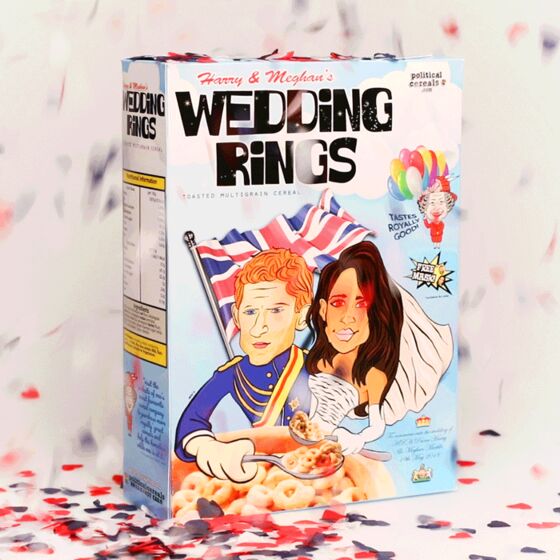Inside the Big Business of Royal Weddings
The wedding of Harry, sixth in line to the throne, to Meghan, marks a watershed moment in the institution’s history.

(Bloomberg) -- In quitting Hollywood to marry a prince, Meghan Markle is giving up a successful career to join the business of being a British royal.
And what a money-making machine it is—though it often tests the boundaries of good taste and escapes the control of the monarchy. To celebrate the marriage of Prince Harry to his American bride this Saturday, fans can buy wooden spoons with the couple’s faces, swimsuits—even condoms.
This sea of tacky merchandise is just one measure of how much the British monarchy boosts the economy. Almost 5 million people flocked last year to see Buckingham Palace, Queen Elizabeth’s London residence, and royal tourism is estimated to rake in $747 million a year.
It is also set to give shops a windfall boost of 120 million pounds ($162 million) as Brits splurge on memorabilia, and hold street parties and barbecues, according to the Centre for Retail Research.
The wedding of Harry, sixth in line to the throne, to Meghan, a biracial divorcee, marks a watershed moment in the institution’s history. Political pundits dwell on this bastion of tradition and its ability to renew itself. Pop culture media outlets are drawn to comparisons with Grace Kelly, who also abandoned show business to marry a prince, and Wallis Simpson, an American socialite whose second marriage to Edward VIII triggered his abdication.

The British royal family has suffered its recent ups and downs. The 1990s were a low point, with the death in 1997 of Princess Diana, Harry’s much-beloved mother, whose car crashed as she was being pursued by paparazzi. The Queen was forced into making a public statement about her former daughter-in-law as newspapers and television debated the future of the monarchy.
More than two decades later, it’s hard to imagine a time when it has been as popular, or rehabilitated, with award-winning shows such as “The Crown.”

The voices questioning whether the monarchy is a cost worth maintaining have died down. Queen Elizabeth, 92, receives income through a real estate corporation called The Crown Estate which gives its profits—more than 2.6 billion pounds over the last decade—to the government.
In return, the royal family receives an annual allowance of 15 percent of the profits. That was 42.8 million pounds in the latest available accounts. Elizabeth herself has a net worth of $420 million. The Royal Household estimates that the family costs each person in the U.K. 65 pence a year in taxes.

The latest gossip or image of the royal family sells tabloids and drives online traffic in the U.K., and the media frenzy surrounding the newest royal couple is no different—including its potential pitfalls. Less than a week to go to the big day, The Sun and others reported that Thomas Markle won’t be walking his daughter down the aisle after he admitted to staging paparazzi photos.
In response, the palace put out a plea: “This is a deeply personal moment for Ms. Markle in the days before her wedding. She and Prince Harry ask again for understanding and respect to be extended to Mr. Markle in this difficult situation.”
To contact the editor responsible for this story: Flavia Krause-Jackson at fjackson@bloomberg.net, Stuart Biggs
©2018 Bloomberg L.P.